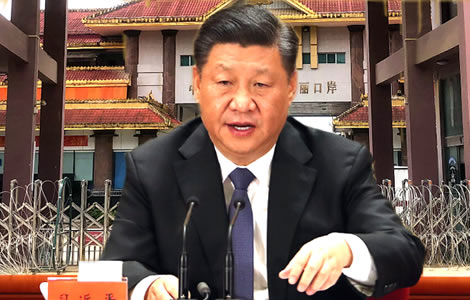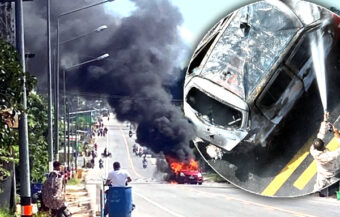China shuts down border crossings with Myanmar after a grenade attack on its consulate, raising tensions. As the junta weakens, grassroots resistance grows, fueling inflation and fears of chaos. Will China choose sides before the rebels strike a fatal blow?
As Burma’s reviled junta loses its grip on power, there are indications that the grassroots resistance against the Tatmadaw is at the same time hostile to China. China has been desperately trying to balance its support for both sides of the struggle. In particular, in recent months, it has demonstrated its influence over key militias to keep the junta from complete collapse, particularly in relation to the fall of Lashio in Shan State in August. This week, in response to a grenade attack on the consulate in Mandalay, China closed all border crossings, cutting off trade. The move threatens to drive inflation in the war-ravaged country even higher. In the meantime, with a visit planned to China by General Min Aung Hlaing, the junta boss, questions remain as to where China stands. However, it may have to decide soon before the rebel forces eventually find their way forward and deliver the killing blow to a weakening regime fighting a war it cannot win.

In recent years, China has balanced its influence in Myanmar. It has aimed to support ethnic armed groups and the military junta. However, an attack on China’s consulate in Mandalay has intensified challenges for President Xi Jinping.
On October 18, an explosive device detonated at the consulate in Mandalay, Myanmar’s second-largest city. The incident drew immediate condemnation from the junta and pro-democracy factions.
China quickly demanded an investigation and lodged serious protests with Myanmar authorities. The identity of the attackers remains unclear. Still, this incident reflects growing frustration with China’s dual support.
Military losses and setbacks raise questions about the future of Myanmar’s junta governance
Min Aung Hlaing, the military leader, expressed annoyance at China’s backing of rebel operations against scam centres exploiting Chinese citizens.
This complex situation highlights how China’s influence is waning amid Myanmar’s chaos. The military’s losses against ethnic armies raise concerns about its power retention. The junta has faced significant setbacks recently.
Reports indicate it is close to being expelled from the western-most state bordering Bangladesh. Additionally, it has lost control of townships covering about 86% of the country.
This decline raises pressing questions about military governance in Myanmar. The fall of Lashio, the capital of northern Shan State, marks a critical defeat for the junta. This loss opens a potential pathway for armed groups to attack Mandalay, threatening the junta’s grip on power.
If such an attack occurs, the outcome is uncertain. Observers note that forces loyal to a parallel government established by ousted lawmakers have made sporadic gains in the region.
The “Three Brotherhood Alliance” has claimed victories against junta forces while targeting cybercrime syndicates. Undoubtedly, the fall of Lashio in early August opened up the road to the junta’s demise.
Arakan Army on the verge of seizing Burma’s western Rakhine State as junta power collapses there
Burma’s General Min Aung Hlaing suffers more setbacks as his regime moves towards collapse
In effect, it paves the way to attacks on Mandalay. In turn, this would create another critical front, putting Nay Pyi Taw in play. After that, the highway to Yangon presents itself.
“If successful, such an operation would open an avenue for attacks on the capital at Naypyidaw, posing an existential threat to the regime,” proclaimed a report last month by the International Institute for Strategic Studies in London.
“The recent fall of Lashio has placed the Myanmar military in its most vulnerable position since the 2021 coup.”
China attempts to exert pressure on ethnic armed groups as tensions escalate with the junta
As rebel groups gain strength, China has attempted to pressure them to halt their advances. Lway Yay Oo, spokesperson for the Ta’ang National Liberation Army, stated that China pressured them to stop fighting.
This includes imposing travel restrictions and limiting border trade. The tensions between ethnic armies and the military have escalated, prompting protests from junta supporters.
Min Aung Hlaing has criticised unnamed foreign nations. He meant Beijing, suggesting China’s support for his enemies. China’s foreign ministry however claims to desire stability and peace in Myanmar.
It promotes a ceasefire and de-escalation in the northern regions. However, scepticism lingers about Beijing’s true intentions amid its relations with the junta.
Myanmar’s neighbours express frustration over ongoing violence and urge China to intervene
Myanmar’s neighbours are increasingly frustrated with ongoing violence. During a recent ASEAN summit in Laos, leaders urged China to pressure the junta to end hostilities.
This plea underlines growing international concern about potential chaos in Myanmar. China’s engagement with the junta signals a policy shift. Foreign Minister Wang Yi recently praised the “pauk-phaw friendship” during discussions with Min Aung Hlaing.
The junta leader is reportedly set to visit China next month, marking his first trip since the coup. Analysts view this potential meeting as a significant pivot.
If Min Aung Hlaing meets with Xi Jinping, it could indicate deeper support for the junta amid rising chaos. In addition to these geopolitical complexities, trade disruptions between China and Myanmar are increasing.
Following the consulate attack, China began closing all border trade posts with Myanmar. This affects both formal and informal trade routes and raises inflation concerns. Myanmar heavily relies on China for essential goods.
Trade disruptions threaten Myanmar’s economy as inflation and shortages loom
A senior member of Myanmar’s largest business lobby warned of impending shortages of goods and skyrocketing prices.
The closure affects vital trade routes, including the Muse trade zone and several border posts in Kachin and Shan states. As fighting intensifies in these areas, the situation becomes increasingly precarious.
Businesses have shifted their reliance from the Muse trade zone to informal crossings due to security volatility. The UN COMTRADE database reveals a significant trade deficit. Myanmar’s exports to China totalled $3.43 billion last fiscal year.
In contrast, imports reached $11.4 billion. The escalating chaos in Myanmar poses challenges not only for the country but also for China’s influence in the region.
Join the Thai News forum, follow Thai Examiner on Facebook here
Receive all our stories as they come out on Telegram here
Follow Thai Examiner here
Further reading:
Arakan Army on the verge of seizing Burma’s western Rakhine State as junta power collapses there
Burma’s General Min Aung Hlaing suffers more setbacks as his regime moves towards collapse
Ex-Senator gives PM Srettha 50:50 odds on surviving this Wednesday. Not impressed with his defence
Political maelstrom may be unleashed in June with potential crises brewing and coming to a climax
PM survives Constitutional Court’s call in a close run thing raising real questions over his future
PM Srettha Thavisin could be temporarily toppled from power on Thursday by the Constitutional Court
Digital Wallet plan blown out of the water by corruption body on Tuesday warning of illegality


















